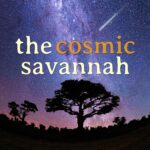Podcaster: Jacinta Delhaize and Dr Daniel Cunnama ; Guest: Dr. Nicolas Erasmus

Title: The Cosmic Savannah – Ep. 49: SALT – Spectroscopy
Link : www.thecosmicsavannah.com ; @cosmicsavannah (twitter, facebook & instagram) ; https://thecosmicsavannah.com/episode-48-atlas-holding-up-the-heavens/
Description:
The IAU celebrates Women and Girls in Astronomy Month throughout February, from February 11th, 2022 in tandem with the United Nations’ International Day of Women and Girls in Science, to International Women’s Day on 8 March.
To celebrate this we speak with Dr. Elizabeth Naluminsa, a wonderful woman who is one of the first Ugandan women to obtain her PhD in Astronomy. Her dissertation topic was “Star Formation and Disk Stability in Nearby Galaxies”, which puts her at the forefront of galaxy evolution studies.
Liz is now working at the South African Astronomical Observatory with the Southern African Large Telescope ( SALT ) and she speaks with us about her work on SALT and SALT instrumentation.
Bio: Dr Jacinta Delhaize and Dr Daniel Cunnama are astronomers based in Cape Town, South Africa. Jacinta is a Research Fellow at the University of Cape Town. She spends her time using huge radio telescopes to study gas and black holes in distant galaxies. Daniel is the Science Engagement Astronomer at the South African Astronomical Observatory. He likes to use large supercomputers to create simulations of galaxies. Both Jacinta and Daniel love to promote the incredible astronomy happening across the African continent.
Dr. Nicolas Erasmus from SAAO.
Today’s sponsor: Big thanks to our Patreon supporters this month: Paul M. Sutter, Chris Nealen, Frank Frankovic, Frank Tippin, Jako Danar, Michael Freedman, Nik Whitehead, Rani Bush, Ron Diehl, Steven Emert, Brett Duane, Don Swartwout, Vladimir Bogdanov, Steven Kluth, Steve Nerlich, Phyllis Foster, Michael W, James K Wood, Katrina Ince, Cherry Wood.
Please consider sponsoring a day or two. Just click on the “Donate” button on the lower left side of this webpage, or contact us at signup@365daysofastronomy.org.
Please visit our Patreon page: https://www.patreon.com/365DaysOfAstronomy
or you can consider to sponsor a day of our podcast : https://cosmoquest.org/x/365daysofastronomy/product/sponsor-an-episode-of-365-days-of-astronomy/
Transcript:
Sutherland has become the latest observatory to host an asteroid tracking system funded by NASA.
The four-telescope Asteroid Terrestrial-impact Last Alert System (ATLAS) system, operated by the University of Hawaiʻi (UH) Institute for Astronomy (IfA), is the first survey capable of monitoring the entire dark sky for hazardous asteroids every 24 hours.
The expansion of ATLAS from two existing northern-hemisphere telescopes in Hawaii sees the addition of one telescope at the South African Astronomical Observatory (SAAO) and one in Chile, at the El Sauce Observatory.
On January 22 2022, ATLAS-Sutherland discovered its first near-Earth object (NEO). 2022 BK is a 100-meter asteroid that passed Earth at a distance 17 times that of the distance to the Moon on Jan 28, 2022. It currently poses no threat to Earth.
To date, the ATLAS system has discovered more than 700 near-Earth asteroids and 66 comets, including detection of 2019 MO and observations of 2018 LA, two very small asteroids that actually struck the Earth. The system is specially designed to detect objects that approach very close to Earth – closer than the distance to the Moon, about 384,000 kilometres away.
End of podcast:
365 Days of Astronomy
=====================
The 365 Days of Astronomy Podcast is produced by Planetary Science Institute. Audio post-production by Richard Drumm. Bandwidth donated by libsyn.com and wizzard media. You may reproduce and distribute this audio for non-commercial purposes.
This show is made possible thanks to the generous donations of people like you! Please consider supporting to our show on Patreon.com/365DaysofAstronomy and get access to bonus content.
After 10 years, the 365 Days of Astronomy podcast is entering its second decade of sharing important milestone in space exploration and astronomy discoveries. Join us and share your story. Until tomorrow! Goodbye!

